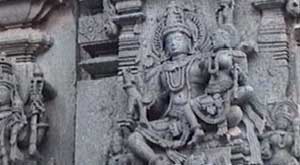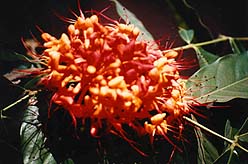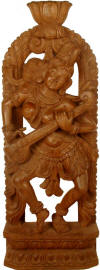The Birth of the Poet-Author of the Bhagavad Gita & the Mahabharata: Krishna Dvaipayana Vyasa
 ‘Whatever
about Dharma (Cosmic Law), Artha (Goal & Purpose), and Kama (Desire), that
is contained in this Mahabharata, may be met with else where; but whatever is
not in it, is not to be found anywhere.’ (M.N. Dutt Vol 1. Ch. 62.53, Adi
Parva)
‘Whatever
about Dharma (Cosmic Law), Artha (Goal & Purpose), and Kama (Desire), that
is contained in this Mahabharata, may be met with else where; but whatever is
not in it, is not to be found anywhere.’ (M.N. Dutt Vol 1. Ch. 62.53, Adi
Parva)
According to the text itself, the Mahabharata was written in three years by Krishna Dvaipayana Vyasa and the poet modestly tells us that hearing the Mahabharata is better than attaining heaven. The sacred Sanskrit texts often promise spiritual and celestial rewards simply by the act of listening to them. The Mahabharata is no exception to this charming pitch and states that those who hear it read, or read it to others will go to the world of Brahma and become equal to the celestials. The text also promises that the Mahabharata makes the heart desire to attain salvation.
So in this spirit - as I have always wanted to be an Apsara, a sort of celestial dancing enchantress - I take delight in retelling the story of the birth of Krishna Dvaipayana Vyasa, the poet author of the Mahabharata and its Bhagavad Gita.
The Birth of the Poet Krishna Dvaipayana Vyasa
Uparichara Vasu was a king devoted to virtue and hunting, but one day this king lay down his weapons and became an ascetic. He practiced such severe and power producing austerities that Indra, the ruler of the celestials, became frightened. Did Uparichara Vasu seek to replace him?
Feeling afraid, Indra appeared to Uparichara Vasu and extolled the beauties and great qualities of an earthly kingdom and his life. Thus making Uparichara Vasu feel exceeding proud and fortunate to be a king on earth. Declaring his friendship, Indra gave him gifts, perhaps a bribe of sorts to keep his sights off Indra’s domain.
The gift most interesting to me was a large celestial crystalline chariot that was capable of carrying the king through the sky. These flying ships, or as J.A.B. van Buitenen has translated them ‘airborne chariots’, are sprinkled throughout the Sanskrit texts. Even though Uparichara Vasu has a physical body, he alone among mortals will be able, by the power of Indra’s maya, to fly across the sky like a celestial.
One fine Spring day, Uparichara Vasu was hunting in the forest - presumably having given up his austerities. The entire forest was ‘maddened by the sweet notes of Kokilas (birds) and echoed with the hum of intoxicating bees.’ In other words, the potent fervor of the birds and the bees inflamed his manly passion. The king became ‘maddened’ by desire and sat down beneath a blooming Ashoka tree, the tree of love blossoms, to cool off.
 The
sweet fragrance of the Ashoka blossoms permeated the air and a soft breeze blew
through the forest. Intoxicated by the power of Spring and the perfume of the
luxuriant flowers, Uparichara Vasu became so excited that he spilled his seed.
To ‘save its utility’ (M.N. Dutt) he collected that liquid on a leaf. Perhaps
in those days men valued their sacred source of DNA and did not squander it as
freely as in our times.
The
sweet fragrance of the Ashoka blossoms permeated the air and a soft breeze blew
through the forest. Intoxicated by the power of Spring and the perfume of the
luxuriant flowers, Uparichara Vasu became so excited that he spilled his seed.
To ‘save its utility’ (M.N. Dutt) he collected that liquid on a leaf. Perhaps
in those days men valued their sacred source of DNA and did not squander it as
freely as in our times.
Consecrating the sperm with mantras, Uparichara Vasu gave the leaf to a hawk nearby to deliver to the king’s wife back home in the palace so the life giving seeds would not be wasted. But as fate would have it, high in the sky the delivery-hawk was met by another hawk who mistook the leaf for a bit of meat and attacked. During the fight, the seeds of life fell into the Yamuna river.
 Deep in
the waters of the river there lived an Apsara who had been cursed by a Brahmana
to live as a fish. These willful men are always causing some sort of mischief,
losing their tempers and cursing some unsuspecting soul through the auspicious
powers acquired by their great austerities.
Deep in
the waters of the river there lived an Apsara who had been cursed by a Brahmana
to live as a fish. These willful men are always causing some sort of mischief,
losing their tempers and cursing some unsuspecting soul through the auspicious
powers acquired by their great austerities.
Seeing the seed of Uparichara Vasu in the water, the Apsara-fish swallowed them. Ten months later she was caught by fishermen, who cut her open and found two children of human form - a boy and a girl. As soon as the children were born, the Apsara was released from her fish form, which apparently was the condition of her curse, to return to her sky-dancing with the other celestials.
The fishermen then gave the children to the king, Uparichara Vasu, who made the male his heir. The girl was both beautiful and virtuous, but because of her birth from the womb of a fish, albeit a cursed Apsara, she smelled of fish and so the king gave her back to the fishermen.
The girl’s name was Satyavati and she spent her days running a boat across the river Yamuna. One day a wise Rishi (Seer) saw her and overcome by her beauty, desired to have her. Desire/Kama is always a driving force in the human drama and that truth is also to be found in the Sanskrit tales.
Satyavati resisted the advances of her Rishi, observing that there were many more Rishis standing on the banks of the river who might see them. Inflamed by his desire for her, the determined Rishi created a fog and covered the entire place with darkness. Being a virtuous girl, Satyavati still protested, saying that if she lost her virginity she would not be able to bear life.
Being a man, the Rishi was naturally pleased by her efforts to resist him and promised her that she would remain a virgin even after their love making. He also offered her any boon she might desire. Boons play an important part in the Sanskrit texts and many a plot is thickened by boons given by deities and Seers.
Satyavati asked for the boon of becoming sweet scented, in other words the poor girl wanted to lose her fishy smell. Not only did she lose her foul fish odor, but the Rishi gave her such an intensely sweet fragrance that it permeated great distances.
That day Satyavati conceived a child, which was born on an island (dvai) in the river Yamuna and that child was none other than the poet author of the Mahabharata, Krishna Dvaipayana Vyasa!
***
I retold this tale because first I think it is absolutely charming and also reveals some intriguing ideas, such as the gift of the crystal flying car and Indra’s fear of humans becoming too powerful which is expressed in the Brihadaranyaka Upanishad.
And to this day, [those] who...know the self as I am Brahman [IS-ness], become all this universe.
Even the gods [any other dimensional beings] cannot prevent his becoming this, for he has become their Self. ...if a man worships another deity thinking: He is one and I am another, he does not know.
He [who does not know] is like a sacrificial animal to the gods. As many animals serve a man, so does each man serve the gods. Even if one animal is taken away, it causes anguish to the owner; how much more so when many are taken away!
Therefore it is not pleasing to the gods that men should know this [that they are IS-ness].
Brihadaranyaka Upanishad, I.iv.10
I also wanted to give the flavor of the Mahabharata in the sense that the stories are created with intensely complex plots, as events are woven together in a magical way designed to hold your attention. These stories would have been passed down the generations around the fire, on your father’s knee, or nestled in your mother’s lap. These stories, laden with timeless wisdom as they are, would have been imprinted in your heart from childhood as a resource always available to you, the yardstick by which to evaluate your own life experiences. The tales are imbued with the Wisdom of the Ages.
Now on to the events that lead up to the Bhagavad Gita ...
